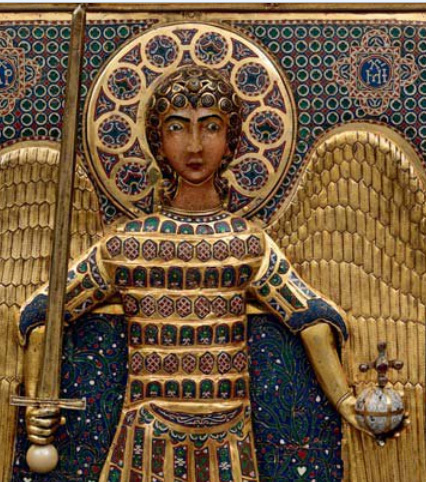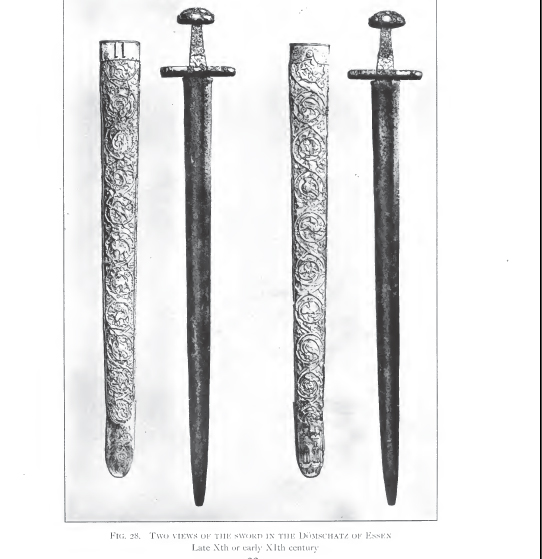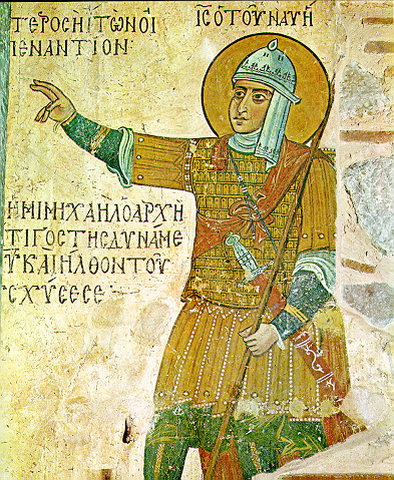| Author |
Message |
Maurizio D'Angelo

|
 Posted: Wed 16 Sep, 2009 12:56 pm Post subject: The Byzantines - 1050-1075 Posted: Wed 16 Sep, 2009 12:56 pm Post subject: The Byzantines - 1050-1075 |
 |
|
I have need your help.
I do not know if it's a stupid question.
The Byzantines, in 1050-1075 that had the sword?
The Byzantines of Southern Italy, could have different swords?
In southern Italy did not find swords to be certain. Swords were X or XI?
Some photos, with explanations would be welcome.
Thanks in advance to all those who have the courtesy to respond.
Ciao
Maurizio
|
|
   |
 |
|
Ben P.
|
 Posted: Wed 16 Sep, 2009 1:19 pm Post subject: Posted: Wed 16 Sep, 2009 1:19 pm Post subject: |
 |
|
|
Well I know the byzantines at that time had a spathion (derived from the word spatha) and it was doudle edged 90 cenimeter blade with a hand-an-a-half cruciform hilt. They had a saber called a Paramerion and in Italy they probably would have the same thing.
|
|
  |
 |
|
Diviccaro Roberto
|
 Posted: Wed 16 Sep, 2009 3:10 pm Post subject: Posted: Wed 16 Sep, 2009 3:10 pm Post subject: |
 |
|
Maurizio
these are byzantine elsos.
bye
 Attachment: 134.47 KB Attachment: 134.47 KB
[ Download ]
|
|
  |
 |
Maurizio D'Angelo

|
 Posted: Wed 16 Sep, 2009 6:45 pm Post subject: Posted: Wed 16 Sep, 2009 6:45 pm Post subject: |
 |
|
| Diviccaro Roberto wrote: | Maurizio
these are byzantine elsos.
bye |
Roberto,
if in Italian "Elsa" is a correct term in English is hilt.
He he my English improves.   
Just kidding, of course.
Ben, Spathion and Paramerion, I've already heard these words.
Ciao
Maurizio
|
|
   |
 |
Maurizio D'Angelo

|
 Posted: Fri 18 Sep, 2009 4:49 pm Post subject: Posted: Fri 18 Sep, 2009 4:49 pm Post subject: |
 |
|
Dear Lady and Gentlemen,
I tried spathion photos. I have not found anything.
But spathion not exist in museums? I tried also in my drawers.
I have only found a sword in the Byzantine Museum of Taormina in Sicily.
It dates from the eighth century. Too old for me.
I found many books, but no photos.
The photo below is in Venice. Icon of Arcangel Michael - Sack of Costantinople 1204.
In your opinion would be wrong if it brings a Byzantine of the XI century, this sword?
This sword is not a spathium?
Ciao
Maurizio
 Attachment: 160.82 KB Attachment: 160.82 KB

|
|
   |
 |
|
Diviccaro Roberto
|
 Posted: Fri 18 Sep, 2009 11:44 pm Post subject: Posted: Fri 18 Sep, 2009 11:44 pm Post subject: |
 |
|
AH Professò
these are better


this is a spathion. It's without fuller. for me is a X-XI c.
bye
|
|
  |
 |
|
Diviccaro Roberto
|
|
  |
 |
Maurizio D'Angelo

|
 Posted: Sat 19 Sep, 2009 2:19 am Post subject: Posted: Sat 19 Sep, 2009 2:19 am Post subject: |
 |
|
Thanks Roberto, the dating is sure.
Without fuller?
Note that after the restoration, the position of the ball and the sword.
Ciao
Maurizio
|
|
   |
 |
Maurizio D'Angelo

|
 Posted: Tue 22 Sep, 2009 8:53 am Post subject: Posted: Tue 22 Sep, 2009 8:53 am Post subject: |
 |
|
hi all
In this period I read a lot. I found a book .
by Guy Lakin vol. I pag. 97-98:
The locket mounts display on the front face the two patron saints of
Essen, St. Kosmas and St. Damian, and on the rexerse side the inscription:
GLADIVS, CV.M OVO DECOLLATI 1-VEKVNT NOSTRI PATRONI.
If this wonderful sword, or at least its mountings, were executed in
Germany, either at the time of Otto III or Henry II, the town of Treves or
Ratisbon might either have produced them.
Such applied arts in the Xth and Xlth centuries then flourished in
Treves under Archbishop Egbert, 977-993, rendered with a strong Byzantine
influence, or at Ratisbon under Abbot Ramvold von Emmerau, 979-1001.
If Italy was responsible for the mounting of this sword, either Venice or
Monte Casino might have been its birthplace. Works produced there likewise
show Byzantine influence, such as is in the designs of foliage and
animals conjoined with the leaves on this scabbard. There is the possibility
that it was made in Constantinople, and either looted from there or sent as a
present by the Empress Theophano to one of the German emperors, afterwards
to be presented by them to the Abbess of Essen.
We have given more space to the consideration of the Essen sword
than to the other weapons of this time, partly because we appreciate it as
the most important of its period extant, and certainly the most complete in
all its parts.
is wrong to consider this a spathion?
What are the differences with a viking sword?
 Attachment: 121.79 KB Attachment: 121.79 KB

|
|
   |
 |
|
Diviccaro Roberto
|
|
  |
 |
Bruno Giordan

|
 Posted: Tue 22 Sep, 2009 10:09 pm Post subject: Posted: Tue 22 Sep, 2009 10:09 pm Post subject: |
 |
|
GLADIVS, CVM QVO DECOLLATI FVERVNT NOSTRI PATRONI.
the sword with witch our patrons were decapitated. A bit late period .....
As there is now wooden handle, the decoration in golden sheet seems to have been applied directly on the tang, likely the sword was made pass for a relic, being devoid of the handle already, then it was covered with the gol artwork.
I guess an old sword was made pass for an ancient gladius in the late middle age or renaissance, when memory of such earlier styles had faded.
,
|
|
  |
 |
|
Diviccaro Roberto
|
|
  |
 |
Maurizio D'Angelo

|
 Posted: Wed 23 Sep, 2009 12:16 pm Post subject: Posted: Wed 23 Sep, 2009 12:16 pm Post subject: |
 |
|
The Sword of Essen is not typically Byzantine miss some characteristics.
Now I know. Perhaps only a Byzantine influence.
Do not find funny, poor documentation about the Byzantine sword? Have in museums around the world, all types of swords, we have nothing, for this type.
Why?
Here a type:
 Attachment: 100.97 KB Attachment: 100.97 KB

notice the cord near the pommel
|
|
   |
 |
|
Diviccaro Roberto
|
|
  |
 |
Maurizio D'Angelo

|
 Posted: Sun 27 Sep, 2009 4:26 pm Post subject: Posted: Sun 27 Sep, 2009 4:26 pm Post subject: |
 |
|
Does anyone know if these authors are reliable?
Byzantine Armies
Ian Heath
Byzantium at War
John Haldon
Costantinople
David Nicolle (sure)
Byzantine Infantryman
Timothy Dawson
|
|
   |
 |
|
|

